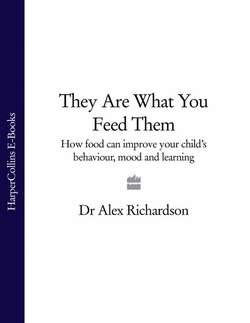Читать книгу They Are What You Feed Them: How Food Can Improve Your Child’s Behaviour, Mood and Learning - Dr Richardson Alex - Страница 9
They Are What You Feed Them
ОглавлениеIn recent years public concern has finally been mounting about the unhealthy nature of many children’s diets, but it took Jamie Oliver’s dramatic exposé about school dinners to put the shocking issues right in front of us. The British Medical Association, not usually known for its radical stance, has since joined in and demanded that something be done about children’s nutrition.
The evidence is now undeniable that poor nutrition is putting children’s physical health at risk. Many children are now expected to die before their parents—as a direct result of their unhealthy diets and lifestyles.
The epidemic of overweight and obesity in children is the most obvious sign that all is not well, and has become rather difficult to ignore. For years, the food industry and its supporters have always got away with blaming the expanding waistlines of our children purely on lack of exercise—but as anyone with half a brain can see, poor diets are equally, if not more, to blame.
The physical health problems that accompany, and in most cases precede, such unhealthy weight gain are not usually so obvious to the naked eye. The underlying problems that are leading to Type II diabetes (in which the body stops responding normally to insulin), even in children, often go unnoticed until this has already caused major health problems. Type II diabetes used to be a rare disease that occurred mainly in old age. If you follow the advice given in this book, however, I can almost guarantee that your child will not fall victim to this ‘silent killer’.
The effects of food on behaviour are also invisible, but very real. The brain is part of the body, and it relies on the same food supply to meet its needs. However, despite this obvious fact, almost no attention has been focused on the importance of nutrition for children’s behaviour and learning.
Many children’s diets are high in sugar, refined starches and the wrong kinds of fats, as well as artificial additives. They are high in calories (energy), but lacking in essential nutrients. The risks to physical health of such a ‘junk food’ diet are now recognized, but their potential effects on children’s behaviour, learning and mood are still largely ignored. The (very limited) research that actually exists into human requirements for different nutrients has never even taken brains and behaviour into account.
